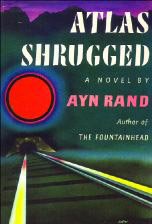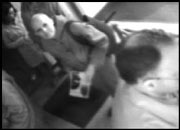ENOUGH ABOUT YOU
by David Shields (Vintage Books, $12) University Book Store, 4326 University Way N.E., 634-3400, 7 p.m. Thurs., May 2; Elliott Bay Book Co., 101 S. Main, 624-6600, 7:30 p.m. Tues., May 7; Third Place Books, 17171 Bothell Way N.E., 366-3333, 7 p.m. Wed., May 8
DAVID SHIELDS loves sexy girls and the novelist Vladimir Nabokov and the basketball player Vince Carter, but the person David Shields loves most, more than anyone, is David Shields.
As a kid, he was the star shooter on his basketball team. In college, he scratched into the concrete library wall, “I shall dethrone Shakespeare.” In his new so-called literary collage of an autobiography, Enough About You, he recalls that his father taught him “to not accept accepted wisdom, to insist on my own angle, to view language as a playground, and a playground as bliss.” (Unacceptable accepted wisdom evidently includes that rule about splitting infinitives.) Defiantly individual and in love with language is one thing; self-aggrandizing and unconscionably pretentious, another. For all his talents as a novelist and journalist, Shields is the kind of person whom no one—not in the pages of a book nor at a cocktail party—wants to hear talk about himself.
Writing your autobiography is an inherently presumptuous undertaking—the presumption being that anyone actually cares to read 200 pages of your own words on your own life—and for this reason, celebrities write many of them, and serious writers do not. We expect autobiographies from Rosie O’Donnell and Tiger Woods and Michael J. Fox because there is great national interest in their lives. We expect serious writers, on the other hand, to translate the events of their lives into material for fiction—which Shields has already done before and done well. (His Dead Languages was, in his own words, “an extremely autobiographical novel.”) There are exceptions, of course, but David Shields is not Nabokov, and he’s certainly not Virginia Woolf, and there is no great demand for any account of his life and his writerly methods.
To make matters worse, the account of his life that he’s produced is not complete. Irritatingly, he populates the book solely with people who have adored him: a colleague at his high-school newspaper who envied his talents; a college girlfriend who, Shields says, “loved me more than God could.” He does not discuss his immediate family whatsoever, except to say that his father was upset by his fictional portrayal in Dead Languages; nor does he discuss his marriage, his fatherhood, his career as a professor at the UW, or the 1994-1995 basketball season, during which he wrote his highly acclaimed Black Planet: Facing Race During an NBA Season and contributed, as a freelance sportswriter, to this newspaper.
Throughout the book, he maneuvers back and forth between discussing his own books and discussing great contemporary works of literature—Renata Adler’s Speedboat, Sylvia Plath’s confessional poetry—insisting, by positioning his work within proximity to theirs, that his own writing belongs on the same level.
Indirectly driving at a means to discuss his Jewish identity, he launches into a fairly frivolous analysis of Adam Sandler’s “The Chanukah Song” that reveals nothing that hasn’t already been said about that song in the eight years since it was written. Another chapter is a 25-page assertion that Bill Murray is the most authentic pop personality ever.
In short, this book is a mess.
SHIELDS FANCIES this strange, scattered, highly convoluted work as Proustian in its principal themes, technique, and narrative innovation. Proust’s Swann’s Way, Shields says, was at one point in his life a yearlong addiction. “I loved how Marcel was both sort of the author and sort of a character,” Shields writes, “how the book was both a work of fiction and a philosophical treatise; how it could talk about whatever it wanted to for as long as it wanted to; how its deepest plot was uncovering the process by which it came into being.”
Pretentious as it is to invoke Proust in the first place, Shields has the audacity to imply that this flippant and overwrought compendium of randomness—by virtue of its nonlinear narrative progression and its narrator’s subjective, selective memory— is somehow redolent of Proust’s masterwork. Adler and Plath may be something of a stretch; comparing his work to Proust’s is downright slanderous.
Proust would never “view language as a playground, and a playground as bliss,” and even if he did, he would never describe it like that. He would never construct sentences like “I once felt joy in being alive and I felt this mainly when I was playing basketball and I rarely if ever feel that joy anymore and it’s my own damn fault and that’s life.” And if Proust were a contemporary and he lived in Seattle, it can be said quite confidently, he would never write, “It feels as if it hasn’t stopped raining since shortly after Kurt Cobain’s suicide.” I read that, and then I shot myself.
“This book is an attempt,” Shields says in the prologue, “to make the case that the only real journey is deeper inside.” Nearly 100 years ago, Proust made the same case—and he made it movingly.







